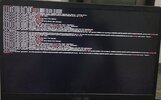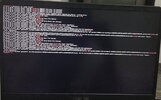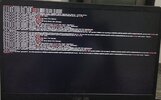I would have continued in my previous thread since it is related but it is closed (Ref:https://pchelpforum.net/t/laptop-fails-to-boot-after-hard-shutdown.71288/)
The Problem:
I was using my laptop to just do some Web development work and suddenly the laptop makes repetitive noises (short, low noise, clunky type, in groups of two) the computer just froze up, I quickly hard shutdown the system and rebooted. The noises reappeared on boot continued for some time while the display stuck on the boot screen. Next it went to GRUB2 bootloader and booted into openSUSE which booted into Emergency Mode. I took some logs of the 'journalctl -xb' command which I have attached here.
Diagnosis (TL;DR version):
1) Checked reseating the RAM
2) Reseated the RAM into a different slot
3) Removed the battery and booted on AC power
4) Removed the SSD, and booted
5) Removed the HDD, and booted
6) Removed SSD, HDD, Battery and booted into a Live openSUSE Installer ISO on AC power
None of this fixed the issue; It went straight into recovery or BIOS.
Software Configuration:
openSUSE 15.3 Leap with SLE Patches; Main File System on the SSD with BtrFS except /home subvolume is mounted on the HDD with XFS.
Hardware Configuration:
Asus TUF FX505DT
AMD Ryzen 3rd Gen H-series
NVIDIA GTX 1650
Intel 660p SSD
Seagate Barracuda 1TB HDD
Addition Diagnosis Notes:
The clunky noises were absent when the HDD was removed. My theory is that the HDD is corrupted somehow, and the OS is trying to mount it and failing. But when I removed it since it will search for /home mount partition systemd will have unsatisfied dependency and fail.
I will also add that the BIOS is showing no devices in the SATA port.
There is no way I can test this without replacing the HDD. One way I 'could' is by preparing a proper Live USB and then once I am in it trying to mount the HDD, but at the moment I neither have a Live USB nor the means of making one.
Is the Hard drive the problem? Or might it be something else?
The Problem:
I was using my laptop to just do some Web development work and suddenly the laptop makes repetitive noises (short, low noise, clunky type, in groups of two) the computer just froze up, I quickly hard shutdown the system and rebooted. The noises reappeared on boot continued for some time while the display stuck on the boot screen. Next it went to GRUB2 bootloader and booted into openSUSE which booted into Emergency Mode. I took some logs of the 'journalctl -xb' command which I have attached here.
Diagnosis (TL;DR version):
1) Checked reseating the RAM
2) Reseated the RAM into a different slot
3) Removed the battery and booted on AC power
4) Removed the SSD, and booted
5) Removed the HDD, and booted
6) Removed SSD, HDD, Battery and booted into a Live openSUSE Installer ISO on AC power
None of this fixed the issue; It went straight into recovery or BIOS.
Software Configuration:
openSUSE 15.3 Leap with SLE Patches; Main File System on the SSD with BtrFS except /home subvolume is mounted on the HDD with XFS.
Hardware Configuration:
Asus TUF FX505DT
AMD Ryzen 3rd Gen H-series
NVIDIA GTX 1650
Intel 660p SSD
Seagate Barracuda 1TB HDD
Addition Diagnosis Notes:
The clunky noises were absent when the HDD was removed. My theory is that the HDD is corrupted somehow, and the OS is trying to mount it and failing. But when I removed it since it will search for /home mount partition systemd will have unsatisfied dependency and fail.
I will also add that the BIOS is showing no devices in the SATA port.
There is no way I can test this without replacing the HDD. One way I 'could' is by preparing a proper Live USB and then once I am in it trying to mount the HDD, but at the moment I neither have a Live USB nor the means of making one.
Is the Hard drive the problem? Or might it be something else?




